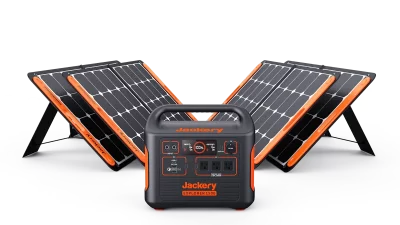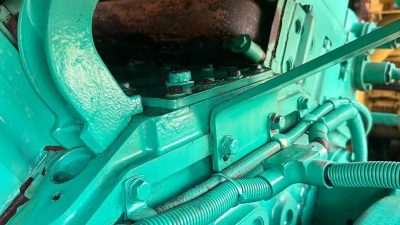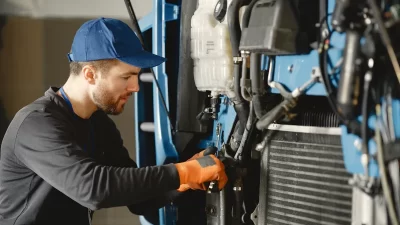
When purchasing quality generators, it’s important to consider how reliable the unit is. You want a generator that performs well and has a long lifespan. Assess the amount of power you use at home and how frequently you’ll need backup power. Look for safety features that protect you during operation. Make sure the generator is user-friendly and easy to operate. Take your time to compare different options and choose a model that offers the best value for many years to come.
Key Takeaways
Figure out how much power you need. Add 25% more to be safe. This helps stop overload and keeps your generator safe.
Pick the right generator type and size for your needs. Think about how much power you use and where you will use it. This helps your generator work well.
Choose generators with safety features. Look for carbon monoxide shutoff and low-oil protection. These features help keep you safe.
Pick fuel types that match how you store and use fuel. Propane gives clean power. Diesel lasts a long time.
Buy from brands people trust. Make sure there is a good warranty. Plan to take care of your generator often. This helps your generator last longer.
Power Needs
Calculate Wattage
You must know how much power you use before buying a generator. This helps you avoid getting a generator that is too weak or too strong. Checking your power needs keeps your generator safe and working well. Groups like NERC and FERC say owners must check their generator models. They want to make sure the generator works as it should. These rules show that checking your power needs is not just smart—it is needed for safety and reliability.
To find out your wattage needs, you can try different ways:
Use a clamp-on ammeter to see your highest power use. Add up the amps from all panels to get your total.
Check your power bills. Find the highest peak in the last year. Add 25% more to cover extra needs.
For businesses, use simple rules. Offices often need 5 watts per square foot plus 50 kW. Stores may need 10 watts per square foot plus 50 kW.
Always keep starting and running wattages apart. Some machines need more power to start than to run.
Use online power calculators to change between kW, kVA, amps, and volts.
Tip: Always add about 25% more to your total wattage. This extra helps your generator handle sudden jumps in power.
Match Generator Size
After you know your total wattage, pick the right generator size. Choose a generator that meets or is a bit more than your needs. If your generator is too small, it might overload and stop. If it is too big, you could waste fuel and money.
For homes, list all important appliances and devices. Add up their starting and running wattages.
For businesses, use square footage and equipment lists to guess needs.
Make sure your generator matches your power phase and voltage.
A right-sized generator keeps your lights on and your things safe. It also helps your generator last longer and work better.
Generator Types

Picking the right generator type helps you get good results. Each type works best for different needs. They have special features and power levels. Here is what you should know:
Portable
Portable generators give power fast and can go anywhere. You can use them for camping or outdoor fun. They also help during short power outages at home. Most portable models use gasoline or diesel. Diesel portable generators last longer and work well for tough jobs. Gasoline models cost less and are easy to fill up at gas stations.
Power output is from 1,000 to 10,000 watts.
Best for: Home backup (short-term), outdoor fun, small job sites.
Easy to move, but big ones may need wheels.
Generator Type | Power Output (Watts) | Fuel Efficiency (kWh/gallon) | Notes |
|---|---|---|---|
Diesel Portable | 3,000 – 15,000 | 8.3 – 15.5 | High efficiency, sturdy, long-lasting |
Gasoline Portable | 1,000 – 15,000 | 4.5 – 8.3 | Lower cost, easy to refuel |
Inverter Portable | 500 – 2,300 | 4.5 – 4.75 | Quiet, clean power, best for electronics |
Tip: Portable generators are good for emergencies. They use more fuel and need to be refueled often.
Inverter
Inverter generators use smart technology for clean, steady power. They change engine speed to save fuel and make less noise. You can use them for laptops, phones, and other sensitive electronics.
They are light and easy to carry.
Best for: Camping, RVs, tailgating, and home electronics.
Standby
Standby generators turn on by themselves when the power goes out. They connect to your home or business power system. Most use natural gas, propane, or diesel. Standby units can be air-cooled or liquid-cooled. Liquid-cooled models handle more power and are good for big homes or businesses.
Power output: 7,000 to 200,000+ watts.
Best for: Whole-home backup, businesses, important places.
Need a pro to install them.
Standby generators are very reliable. They can run for up to three weeks if you take care of them.
Solar
Solar generators use sunlight and batteries for clean power. They are quiet and do not need much care. New batteries make them lighter and stronger. Many can connect to smart home systems for easy checks.
Best for: Small appliances, camping, emergency backup, and sunny places.
No fuel needed, no pollution.
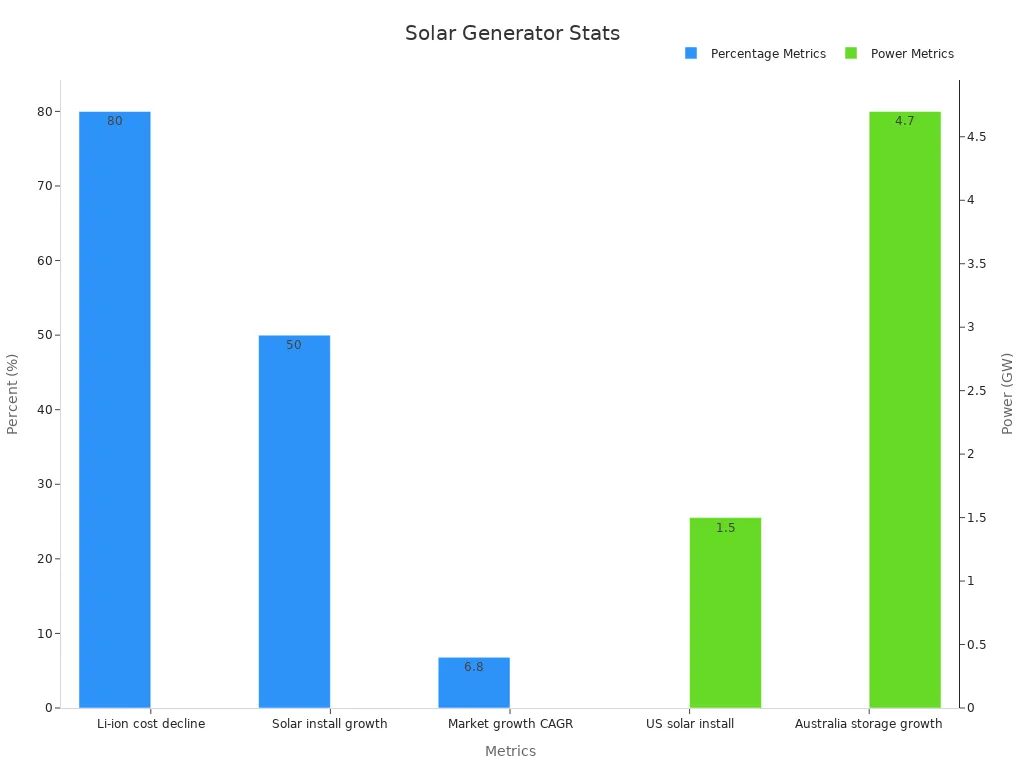
Solar generators are getting more popular. This is because batteries cost less and there are government rewards.
Choosing the Right Type:
Use portable or inverter generators for outside or short-term needs.
Pick standby generators for whole-home or business backup.
Try solar generators for green, low-power needs.
Liquid-cooled models are best for big places with high power needs. Air-cooled models work for smaller homes or light business use. Always pick the generator type that matches your power needs and plans.
Key Features
Safety
When picking a generator, always check for safety features. Many quality generators have carbon monoxide (CO) shutoff sensors. These sensors turn off the generator if CO gets too high. This keeps you safe from harmful fumes. Low-oil shutoff stops the engine when oil is low. This protects the engine from damage. Electric start helps you turn on the generator fast. It is helpful during emergencies. Transfer switches let you connect the generator to your home safely. You do not need to use extension cords. Some models have smart monitoring. This lets you watch how the generator works and find problems early.
Tip: Always use your generator outside and far from windows. This stops CO from building up inside.
Durability
A strong generator lasts longer and saves money over time. Companies test generators to see how long they can run. Experts use the WIDIPRO® process to check insulation aging. This helps them guess how much life is left in the parts. Regular checks and care help some generators last over 50 years. The table below shows how experts study and help generators last longer:
Aspect | Summary |
|---|---|
Diagnostic Method | WIDIPRO® process tracks insulation aging and predicts lifespan |
Lifespan Case Study | Two hydro generators ran 36–53 years with regular checks |
Aging Factors | Heat, electricity, environment, and movement affect aging |
Lifetime Prediction | Uses measurements, not just visual checks, for better planning |
Maintenance Implication | Regular checks help you fix problems early and avoid breakdowns |
Noise Level
Noise is important if you use your generator at home. Some generators are very loud. Others are much quieter. The engine, cooling fan, and exhaust make most of the noise. Loud generators can be as loud as a chainsaw. You can make them quieter with barriers, insulation, or better mufflers. The table below shows where noise comes from and how to lower it:
Noise Source | Noise Level (dB) | How to Reduce Noise |
|---|---|---|
Engine | Use barriers or insulation | |
Cooling Fan | 100–105 | Add sound-absorbing materials |
Exhaust (no silencer) | 120–130 | Install larger mufflers |
For less noise, pick inverter generators or models with soundproofing.
Run Time
Run time means how long a generator works before refueling. Efficient generators use less fuel and last longer. Diesel generators often run 20 to 30 hours on one tank. Gasoline models usually last 8 to 14 hours. Inverter generators can run 8 to 10 hours. They may last longer if you use less power. Standby generators with natural gas can run for days without stopping. Longer run times mean fewer stops and more steady power.
Standby generators: 24 hours to several hundred hours (with natural gas)
Portable generators: 8–20 hours (depends on tank size and load)
Diesel generators: 20–30 hours (high efficiency)
Propane generators: 10–20 hours (cleaner emissions)
Picking a generator with a long run time helps you stay powered during long outages and saves fuel.
Fuel Options
Picking the right fuel for your generator is important. It changes how much you spend and how well it works. Each fuel type has good and bad points. Here is what you should know:
Gasoline
Gasoline generators are very common. You can get gasoline at most gas stations. These generators are good for short or emergency use. Gasoline engines start fast, even when it is cold. But gasoline does not last long in storage. It can go bad after a few months. Gasoline generators are often louder than other types. They also make more pollution. If you use your generator a lot, you may pay more for fuel.
Gasoline is easy to find and refill.
Works well for small and portable generators.
Gasoline lasts about 3 to 6 months.
Makes more noise and emissions.
Propane
Propane is a cleaner fuel choice. You can keep propane for years without it going bad. Propane engines make less carbon monoxide and smog. They also cost less to take care of. The exhaust from propane has little smell or smoke. But propane has less energy, so you might need to refill more often.
Metric | Propane Advantage Compared to Diesel/Gasoline |
|---|---|
CO Emissions | |
NOx Emissions | 20% lower than gasoline |
Smog-Producing Hydrocarbons | 80% lower than diesel |
Shelf Life | Indefinite |
Maintenance Cost | About 40% less than diesel |
Propane is a good pick if you want clean power and easy storage.
Diesel
Diesel generators are strong and last a long time. They can work for many years if you take care of them. Diesel engines can handle heavy use and run for a long time. They use fuel better than gasoline or propane. Diesel fuel is not easy to catch on fire, so it is safer for some jobs. New diesel generators meet tough rules for pollution. But they can be heavy and loud.
Feature | Diesel Generators |
|---|---|
Lifespan | |
Efficiency | High fuel economy |
Reliability | Excellent for critical backup |
Maintenance | Low, but regular checks needed |
Drawbacks | Heavy, noisy, fuel degrades after 1 year |
Natural Gas
Natural gas generators hook up to your home’s gas line. You do not have to store fuel. These generators are quiet and make less pollution. They start easily in cold weather and work well for long outages. The fuel supply is steady if the pipes work. Natural gas is often cheaper than gasoline or diesel if you use it a lot.
Cleanest burning fossil fuel.
Less noise and fewer emissions.
No need to store fuel.
Many generators can use two fuels. This lets you switch fuels to save money. Always check what fuels are easy to get in your area before you choose.
Purchasing Quality Generators
Brand Reputation
When you want to buy quality generators, check the brand first. Good brands have made reliable products for many years. They spend money on research and testing. This helps their generators work well in different places. Brands like Generac, Kohler, Honda, Yamaha, Cummins, and Mitsubishi are often at the top. These companies are known for quality, safety, and helping customers.
Experts and buyers both say brand reputation is important. Orgon Power says Caterpillar, Cummins, Kohler, Generac, and MTU are leaders. They test their generators in hard situations. These brands also have special features like energy management systems and digital controls. You can trust these companies because they make it easy to get parts and service. They also try to help the environment by making their products better for nature.
You can see how top brands compare in the table below:
Brand | Evidence Type | Supporting Details |
|---|---|---|
Honda | Performance & Customer | Known for reliability and quiet operation; customers willing to pay premium for these qualities. |
DuroMax | Performance | Durable engines, innovative dual-fuel technology, popular among RVers for versatility and power. |
Briggs & Stratton | Performance | Produces reliable, powerful engines used by other brands, indicating high engine quality and durability. |
Consumer studies show that Honda, Generac, Caterpillar, DeWalt, Craftsman, Briggs & Stratton, Yamaha, Ryobi, Champion, and Westinghouse are trusted. These brands are known for making generators that last and for helping customers.
Tip: Pick a generator from a brand people trust. This helps you avoid problems and makes it easier to get help if you need it.
You should also look at what kinds of generators each brand sells. Kohler makes generators for homes, small businesses, and big companies. Generac is a leader in backup power for homes and businesses. Atlas Copco, Caterpillar, and Cummins sell many types of generators around the world. When you buy quality generators, choosing a well-known brand helps you feel safe.
Warranty
Warranty is another important part of buying quality generators. A good warranty protects you from paying a lot for repairs. It also shows the company believes in its product. Always check what the warranty covers and how long it lasts. Some brands cover almost everything, while others only cover the engine or powertrain.
Here is a table that shows common warranty types and what they cover:
Warranty Type | Coverage Details | Typical Length/Terms | Usage & Cost Insights |
|---|---|---|---|
Bumper-to-bumper | Covers all defects except normal wear and tear | At least 3 years or 36,000 miles | Reduces out-of-pocket expenses for repairs |
Powertrain | Covers engine, transmission, drivetrain, fuel pumps | 4 years/60,000 miles or more | Good for high repair cost components |
Emissions | Covers emissions-related components | 2 years/24,000 miles minimum | Protects against regulatory failure costs |
Corrosion | Covers factory rust damage | Varies by manufacturer | Protects against costly rust repairs |
Usage Statistics | Only 6.3% buy extended warranties; 47% hold them; only 10% use them | Extended warranties can be helpful for older units or expensive repairs |
Some companies now give performance-based warranties. These warranties promise your generator will work at a certain level during the warranty time. If it does not, the company will fix, replace, or refund it. This kind of warranty gives you more confidence when buying quality generators.
Note: Always read the warranty rules before you buy. Make sure you know what is covered and what is not. Good customer support helps you get help if something goes wrong.
When you compare generators, do not just pick the cheapest one. Cheap models often have short warranties and bad support. You might pay more for repairs or a new generator. Instead, look for quality, trust, and good support. Buying quality generators from trusted brands with strong warranties saves you time and money later.
Budget and Value
Upfront Cost
When you look for a generator, the price is easy to see. The cost you pay first can change a lot. It depends on the type and size you pick. Portable and inverter generators usually cost less than standby ones. Standby and whole-home models are more expensive. Diesel generators often cost less at first than solar systems. This makes diesel a good choice for fast power. Solar and other renewable options may cost more at first. But they can help you save money later.
Upfront Cost Range | Extra Costs | Notes on Use Case | |
|---|---|---|---|
Standby Generators | $5,000 to $10,000+ | Installation, permits, fuel setup | Highest cost, best for full-home backup |
Portable Generators | Lower than standby | Minimal installation | Affordable, good for small needs |
Inverter Generators | Lower than standby | Minimal installation | Quiet, efficient, for electronics |
Diesel Generators | Lower than renewables | Fuel and maintenance | Reliable, higher than portable/inverter |
Propane Generators | Varies, storage tanks | Storage tank investment | Clean, extra cost for tanks |
Natural Gas Generators | Varies, gas line | Gas line connection | Steady fuel, higher install cost |
Looking at costs and benefits helps you decide if a generator is worth it. Tools like net benefit and payback period help you see if your money is well spent.
Installation
Installation costs can get high fast. Standby and natural gas generators need a pro to set them up. You may also need permits and extra wiring or pipes. Portable and inverter generators are easy to use. They do not need much setup, so you save money. Propane generators might need a storage tank. This adds to the price. Always ask about setup fees before you buy.
Standby generators: Need a pro to install
Portable/inverter generators: Easy to use, no setup needed
Propane/natural gas: Might need tanks or gas lines
FEMA says to use cost-benefit analysis for big projects. This helps you make sure your spending matches the value you get.
Maintenance
Taking care of your generator helps it last longer. It also saves you money over time. If you skip maintenance, repairs can cost a lot. You might even need a new generator sooner. Plan for yearly costs, usually between $150 and $300. Doing checks and cleaning helps your generator work better and last longer.
Maintenance cost: Shows how much you spend each year
Mean Time Between Failures (MTBF): Tells how long your generator works without problems
Availability: Shows how often your generator is ready to use
Doing regular checks and cleaning makes your generator more reliable. It also lowers repair costs. A maintenance schedule helps you avoid problems and keeps your generator ready when you need it.
Safety and Care

Operation
You need to use your generator safely to stay protected. Portable generators can make carbon monoxide like hundreds of cars. Carbon monoxide can be deadly in just a few minutes. Always use your generator outside, away from windows and doors. Never run it inside your house, garage, or basement. Do not use it in sheds either. Put a working carbon monoxide alarm in your home. This alarm will warn you if the gas gets too high.
Tip: Keep your generator dry at all times. Never touch it with wet hands. Water and electricity together are very dangerous.
The National Fire Protection Association says to test your generator every week. You should also check it every month for problems. These checks help you find issues early. This keeps your generator ready for emergencies. Some countries have rules to test generators every few years. Regular tests help you find hidden problems. This keeps your power system strong.
Common Safety Hazards and Solutions
Issue Category | Problem Description | Solution / Improvement |
|---|---|---|
Manufacturing | Leaking chamber from calcium scaling | Add pressure-relief disk, update cleaning protocols |
Manufacturing | Weak circuit board connections | Use stronger connectors, upgrade to prevent overheating |
Power Supply | Voltage spikes causing shutdowns | Add surge protector, improve connectors |
Maintenance
Taking care of your generator helps it last longer. It also makes it work better. You should follow a schedule for oil changes and filter replacements. Do regular inspections too. These steps help you find small problems early.
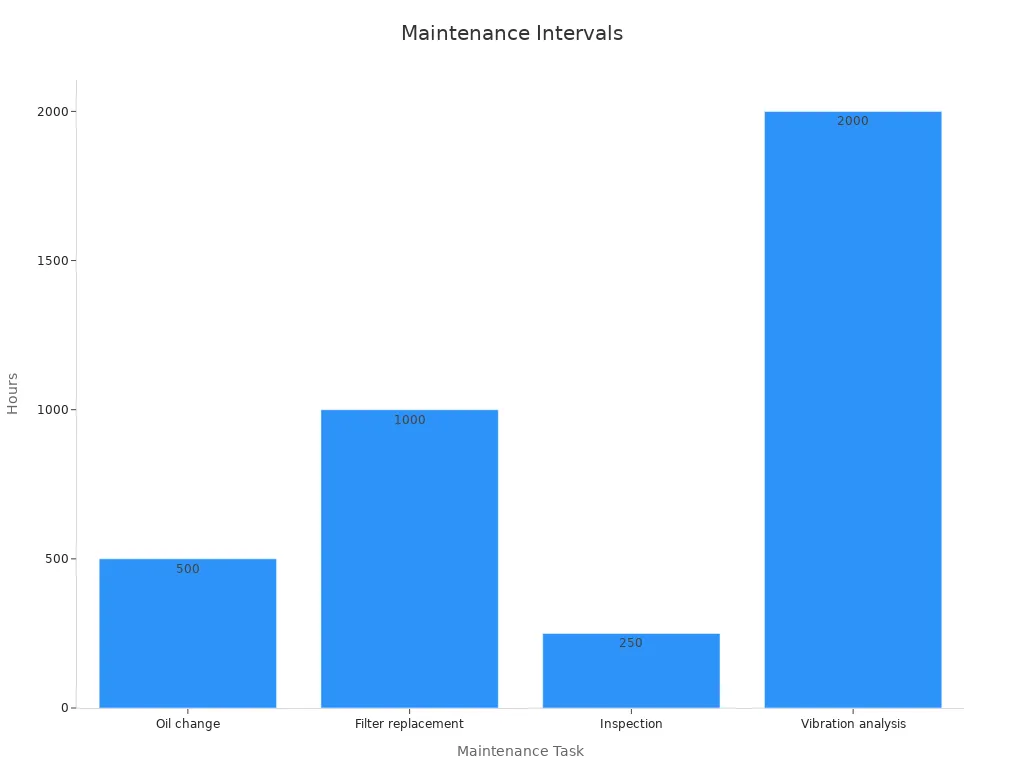
Maintenance Task | How Often to Do It |
|---|---|
Oil change | |
Filter replacement | Every 1000 hours |
Inspection | Every 250 hours |
Vibration analysis | Every 2000 hours |
Vibration analysis helps you find problems early.
Oil analysis checks for dirt or damage in the oil.
Modern control systems warn you about problems before a breakdown.
Doing regular maintenance saves money and time. It also keeps your generator ready when you need it most.
If you follow these safety and care tips, your generator will last longer. It will also work better. You will keep yourself and your family safe.
When you buy a quality generator, pick the right type and features for your needs. Make sure the fuel works for you. Always think about safety and how long the generator will last. Choose brands that people trust. Research shows that good protection and sharing how well it works help generators last longer. These things also help them work well in hard times.
Aspect | Evidence Summary |
|---|---|
Internal Failures | |
Protection Strategies | Working together and smart planning make them safer and more reliable. |
Think about what you need and use these ideas before you buy.
FAQ
What size generator do you need for your home?
First, add up the wattage for all your devices. Pick a generator with at least 25% more wattage than you need. This extra power helps stop overloads. It also keeps your generator working well.
How often should you maintain your generator?
Check your generator once a month. Change the oil after 500 hours of use. Replace filters every 1,000 hours. Doing regular maintenance helps your generator last longer. It also makes it work better.
Can you run a generator indoors or in a garage?
Never run a generator indoors or in a garage.
Generators make carbon monoxide, which is very dangerous. Always use your generator outside. Keep it far from windows and doors.
What is the best fuel type for emergency backup?
Fuel Type | Best For | Notes |
|---|---|---|
Propane | Long storage life | Clean, easy to store |
Gasoline | Short-term use | Easy to find |
Diesel | Heavy-duty use | Long run time |
Pick the fuel that fits your needs and storage best.
